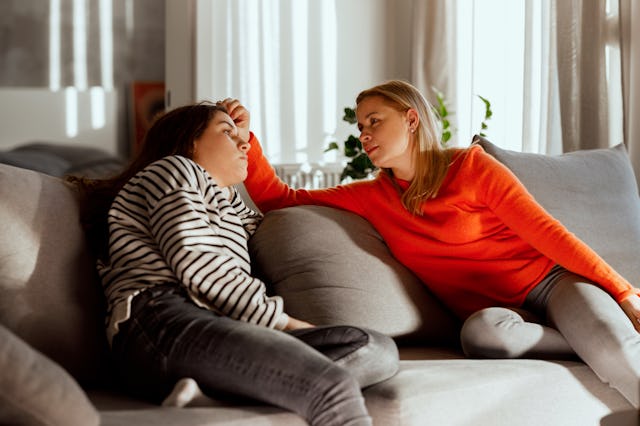How To Help Your Child If They’ve Been Diagnosed With An Eating Disorder
You’re going to play a major role in getting them through.

It’s a dark subject, but for some families, it’s a real thing that is part of their daily life: The number of teens diagnosed with eating disorders nearly doubled during the pandemic, and tragically, they’re one of the deadliest forms of mental illness a person can have. So, it’s understandable how earth-shattering it can be to find out your child is struggling with one. Here, an eating disorder expert tells Scary Mommy how parents can be not only supportive but instrumental in helping their children heal.
“Treating children and adolescents with eating disorders is a fragile undertaking. But there is nothing fragile about the eating disorder itself: it’s a monster that has taken over the child’s brain. Particularly for children — those in the treatment program I lead are as young as 8 — caregivers take on most of the battle,” says Dr. Lauren Salvatore, director of Northwell Health’s Eating Disorders Behavioral Health Center. “We need them to because eating disorders are complex psychological conditions in which the patient may not want to feel better. Young patients sometimes simply don’t have the tools to fight yet. In my decade of experience, I’ve seen the difference it makes when families know they’re a child’s greatest support as they recover and relearn how to eat.”
Let’s say your child just got their diagnosis. You’re overwhelmed and scared. Where the hell do you begin?
Get the right team of medical professionals lined up.
Something your child can’t do for themselves but will absolutely need you for: finding all the necessary doctors to help their body and mind recover. You’ll need to consistently see both medical and behavioral specialists, Salvatore says. They will get to know the dynamics and routines of your family and help you address everything over time, like your child’s nutrition needs and how to tackle eating outside of the home.
Don’t forget to assemble your own support team, whether that’s family, friends, or therapists, Salvatore notes. There will be a significant influx of appointments at first, but then it’ll be about maintaining new routines and habits at home.
Create a positive environment around food and meals.
Doctors and therapists will help you understand how best to do this, and then it’s your job to keep it up at home. They will talk to you about how your family usually prepares and eats meals, your values around food, all of it — and build in new aspects that support your child’s healing.
“Families learn quickly that mealtimes can be the most stressful part of the day for children and adolescents with eating disorders. But it is possible — and crucial — to create calm. Even as they build their child’s plate, parents can learn to shift the focus of mealtime away from food or body image, turning toward topics that make meals more comfortable for everyone,” Salvatore says.
Screen your child’s social media.
It’s no secret that social media can be bad for anyone’s body image, let alone a teen or tween dealing with an eating disorder (and they know it, too). But it can also be a great way to connect with other kids going through the same thing. Every family will have their own approach to monitoring or maybe taking away social media for a time, Salvatore says. Just be sure you pause and address it.
“Where social media presents negative or unattainable images and messages about body image, or dangerous fitness or nutritional trends, adults and families may be able to limit, question, or counteract them. Families also can learn to assess which corners of social media might be a force for good, offering appropriate informational resources, support groups, or like-minded recovery communities,” she says.
Remember your role now and your ultimate goal.
Along the way, remember that your job is to make sure your child develops the skills they need to cope with their eating disorder. Salvatore says parents should lead the charge against the “monster” at first, but the ultimate goal of treatment is for your kid to take up the sword themselves. It’s an increase in autonomy that happens over time, but just something to be mindful of as your child grows.
“Caregivers have the capacity and perspective to start the process so young patients can just be kids. The adults take responsibility for anything that affects food and eating. Otherwise, it’s the child’s responsibility to live, continue school, see friends, become independent from their eating disorder, and build the skills to plate their own nutritious meals.
Know that your child’s eating disorder is not your fault.
Yes, you play a very important role in helping your child move past their eating disorder. But Salvatore says it’s crucial you know you didn’t cause it in the first place. Guilt doesn’t get a seat at your table.
“From anorexia and bulimia to binge eating disorder and avoidant restrictive food intake disorder, these conditions have complex biological mechanisms at play that cannot be oversimplified by pinning blame. For both child and parent, there is no place for guilt,” she says. “It helps when they approach recovery by viewing the eating disorder as a common enemy, one we don’t want our young patients to face as adults.”
Children with eating disorders can recover and make it safe and healthy into adulthood, Salvatore says. What makes it possible is parents who recognize that beating an ED is a family task, not an individual one.